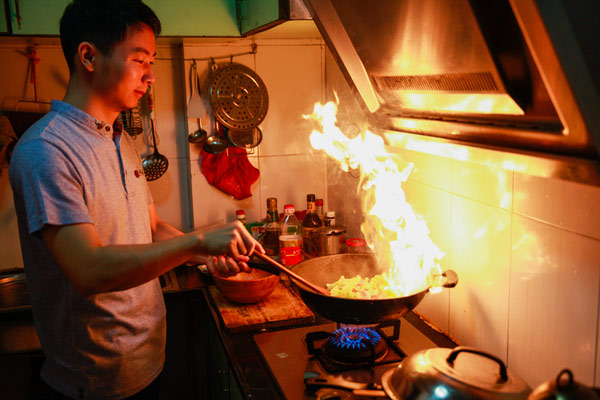
Xiang Dongliang cooks a meal from GM food material at his home in Guangzhou, capital of Guangdong province. Photo by Liu Dongguang/for China Daily
Former agricultural reporter eats genetically modified food for 100 days, posts videos online
A former reporter created a recipe for controversy after posting online videos of him eating genetically modified food.
Xiang Dongliang received more than 100,000 abusive messages — and a death threat — even though he admitted that his 100 consecutive days of eating genetically modified, or GM, food was too small a sample to prove its safety.
"It was more of a declaration. I wanted to show that somebody is actually eating GM foods on a long-term basis." he said. "I was not bankrolled."
Xiang resigned his post as a reporter covering the agricultural beat at a newspaper in Guangzhou, the capital of Guangdong province, in August, and devoted himself to convincing the public that GM technology is safe.
"My reporting experience made me aware of the importance of agricultural technology, and I realized it could play a key role in helping farmers increase their incomes," he said.
As health conscious as anyone, Xiang said he does not smoke or drink, He said he expected a strong response from critics of GM foods, which are derived from organisms whose genetic material has been modified in a way that does not occur in nature, but not the vitriol he encountered.
"I did not expect so many abusive messages to be sent to my social media accounts. They abused me and my family, and even threatened death," he said.
He added: "Most of the messages came from Internet users who were trying to vent their emotions, and none of them were trying to hold rational discussions about the issue of GM technology itself."
Xiang noted that China's social media has been dominated by views opposing genetically engineered agricultural technology, and celebrities, including Cui Yongyuan, a former host with China Central Television, are often at the forefront.
Cui released a 68-minute-long documentary in March 2014 on his Sina Weibo account, claiming that the public did not have adequate knowledge about the dangers of biotechnology in the United States. The documentary further swung public opinion against GM technology, and Cui has remained a vocal activist against biotech methods in the agricultural sector.
In a policy document released last year, the central government said it would intensify efforts to tackle public misconceptions about GM products.
Chen Xiwen, deputy head of the Office of the Central Rural Work Leading Group, said at a news conference last year that China needed to at least create a fair and inclusive atmosphere for discussion of GM products.
The country has, so far, only approved the commercial production of genetically modified cotton and papaya. It has also issued GMO safety certificates for 41 strains of genetically modified agricultural produce developed by international agricultural businesses, allowing them to be imported to China, but only for processing. Any other purpose, such as seed cultivation, is banned, according to a regulation issued by the State Council in 2001.
All GM products on the market must be clearly labeled to ensure the public can make informed choices, according to a regulation issued by the Ministry of Agriculture.
Xiang said he was trying to answer calls from the authorities to bring the debate back to the actual science itself, and he decided to use social media to demonstrate that there are people who are actually eat GM food.
He obtained GM rice from a research institute at Huazhong Agricultural University in Wuhan, and GM corn flour from a research institute under the Chinese Academy of Agricultural Sciences in Beijing. "The products were provided to me for tasting purposes only," he said.
He also purchased GM papaya and canola oil.
During the 100-day trial, Xiang ate at least one category of GM food every day. He made tomato rice, seafood porridge, rice and vegetable rolls, which he said tasted as good as regular food.
He said he had previously assumed that most of those who had doubts about GM technology were influenced by rumors, such as ones that suggested eating such foods could result in infertility.
However, his experiment made him aware that it would be virtually impossible to change public preconceptions about GM food through mere exposition.
"The fact that major GM technology giants are foreign companies has fueled conspiracy theories. Other rumors, such as government efforts to protect the industry with biotech methods or corruption within the agricultural research sector, only made it worse," he said.
"The rumors, where no science is involved, are virtually impossible to refute. It made me feel powerless," he said.
To enhance user acceptance and greater confidence, Xiang said authorities and industry experts must be fully aware of the roots of public concern about the technology before tackling the bias in the market and public opinion.


















































